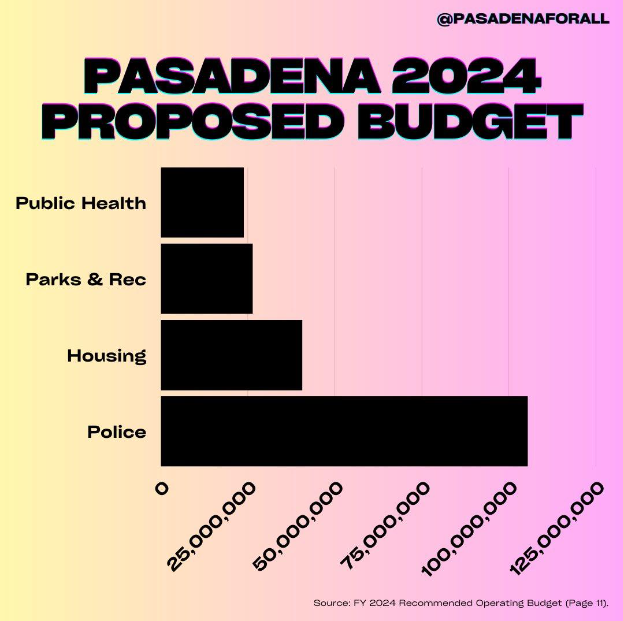 Pasadena’s proposed total Operating Budget is up by a whopping $288 million over last year to a new record total of $1.2 billion. To be fair, that’s inflated by a number of one-time windfalls, including $181 million in Measure R funds for “mobility improvement projects” related to the abandonment of the 710 Freeway extension and $40 million in higher utility ratepayer charges, primarily to pay for the run-up in natural gas prices to produce electricity.
Pasadena’s proposed total Operating Budget is up by a whopping $288 million over last year to a new record total of $1.2 billion. To be fair, that’s inflated by a number of one-time windfalls, including $181 million in Measure R funds for “mobility improvement projects” related to the abandonment of the 710 Freeway extension and $40 million in higher utility ratepayer charges, primarily to pay for the run-up in natural gas prices to produce electricity.
For residents, the more significant number is the $27.3 million increase in the General Fund budget. That’s a 10% jump in spending on the basic services we all rely on: police, fire, libraries, parks, public works etc.
In inflationary times, it’s reasonable to expect the costs of providing government services will go up. But are Pasadena residents getting better or expanded services from this big hike in spending?
Not really, it turns out. There will be a sixth paramedic engine which will presumably shave emergency medical response times. The Jackie Robinson pool will expand its current summertime operation year-round. The City will add staff in the records division of the police department to handle a surge in public records requests. The City will add a “Film Coordinator” to handle commercial filming and photography permits and another building inspector (although the additional permit revenue from these positions will exceed the costs.)
That’s essentially it. The big increase in spending will go to higher salaries and more costly contracts and supplies. None of that enhances services to the residents.
What about affordable housing? The Housing Department’s budget will actually go down by 6%. What about the “climate emergency” the Council unanimously declared back in January? No new staff or programs proposed for climate action or environmental sustainability.
What’s going on here? According to the Government Finance Officers Association, “In traditional budgeting, historical precedent is the primary determinant of how much money is allocated to each line item. This is backward-looking, not forwarding looking.” The pre-eminent national organization of public financial experts criticizes the tendency to “be slow in adopting new and better methods of operating.” They point out that status quo budgeting “is not well-suited to handle big picture and/or emerging issues.” They urge cities like Pasadena to “rethink” the way budgets are done.
They are right. At the opening hearing, Councilmember Jason Lyon argued that “a budget is many things but one of the things it really is, is a statement of values.” The Council and citizens should take a harder look at Pasadena’s budget – and the budget process. The inertia of past programs and practices is racking up rising costs without either improving services or recalibrating priorities. I know from my government service the power of “we’ve always done things that way” that perpetuates outdated approaches and forecloses fresh thinking.

Fresh thinking won’t come from poring over the intimidating columns of numbers that make up the bulk of the 275-page budget book. Instead, take a look at the last 28 pages which detail the performance targets for each department. These measures are supposed to track what all those numbers translate to in terms of actual benefits to the community.
Unfortunately, they don’t tell us much. Start with Police. According to one performance target, the $105 million spent on that department is supposed to lead to a 3% decrease in serious crimes. That’s something citizens care about! Yet because the FBI introduced a new and improved way of measuring crime in 2021, there is no baseline for measuring a 3% reduction. So the budget book says the specific metric is “to be determined.” Most of the rest of the statistics measure activity, not results – such as how many young people participate in the Police Activities League program or the numbers of volunteer hours. There is one other potentially meaningful metric: reducing “the top-ten citizen initiated calls for service from calendar year 2020 by 5%.” But as of the end of the third quarter of this year, those calls are actually running 18% above the current year target number.
Similar for Fire. The Budget book records that in 2022 fire crews arrived on scene within 6 minutes of being dispatched on medical calls 78% of the time. But there are no stats from this year and no target for next year. How much will the investment of $1.2 million to staff another rescue ambulance improve response time? The budget book doesn’t say.
Meaningful metrics are the best way to ensure accountability. Management guru Peter Drucker observed, “That which gets measured gets done.” When it comes to spending over a billion dollars of public money, we should be paying closer attention to the results.
The Council has scheduled hours of hearings on the proposed budget. Yet if history is any guide, their changes will be miniscule – the equivalent of a rounding error. Pasadena deserves better. That starts with rethinking the entire budget – and focusing not on how much we spend, but what we get for our spending.
Rick Cole is the Chief Deputy Controller for the City of Los Angeles and a member of the Government Finance Officers Association. He is a former Mayor of Pasadena and currently a candidate for City Council, District Two.


















